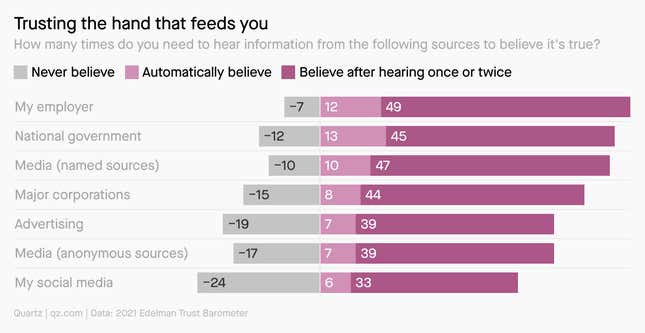Good morning, Quartz readers!
Was this newsletter forwarded to you? Sign up here. Forward to that friend who is still betting on NFTs.
Here’s what you need to know
China raised concerns over local rise in Covid-19 cases. A flare up that kicked off in Nanjing has spread to 18 provinces; the country’s most serious outbreak in months.
Myanmar’s military ruler extended the coup. Six months after seizing power, junta leader Min Aung Hlaing declared that the country’s state of emergency will last until 2023, when he says elections will be held.
Chinese factory activity slowed. Affected by decreasing demand, weak exports, and extreme weather, manufacturing hit its lowest Purchasing Managers’ Index figure since early 2020.
New Zealand apologized for historic deportations. Prime minister Jacinda Ardern issued a “formal and unreserved apology” for the Dawn Raids, a 1970s immigration crackdown against Pacific Islanders.
Gymnast Simone Biles has now withdrawn from all but one Olympic event. She hasn’t indicated if she will participate in the beam final on Tuesday, her last chance to compete for the US in Tokyo.
A US government ban on evictions has expired. The CDC’s moratorium on residential evictions ended July 31, leaving millions of Americans at risk of losing their homes.
What to watch for
This evening in Tokyo, Laurel Hubbard, a weightlifter from New Zealand, will become the first openly transgender athlete to compete in an Olympics. At 43, she’s also the fourth oldest weightlifter ever to participate in the Games. Hubbard left the sport for fifteen years after competing as a man became “just too much to bear,” and returned in 2017, five years after transitioning.
Hubbard will have to perform in the midst of a debate over her right to be there—a debate the International Olympic Committee’s medical director described as “large, difficult, and complex.” The IOC is reviewing the requirements for athletes participating in women’s events, including their reliance on testosterone levels, and the rules are likely to change before the next Games. “As an athlete all I can really do is to block that out,” Hubbard said in 2017, about the controversy. “Because if I try and take that weight on board it just makes the lifts harder.”
There are seven days left of the Tokyo Games. It’s not too late to sign up for our Need to Know: Tokyo Olympics newsletter. Hit the button below to sign up.
Why US companies can mandate shots
Last week, as Delta cases rose dramatically in the US, Google, Facebook, and other big tech companies pushed back their return-to-the-office plans and said that when employees do return, they must be vaccinated. Walmart announced it will require vaccination for workers at its headquarters, and Disney will expect all non-union employees to get their shots.
Fewer than 10% of US companies have mandated vaccination policies so far, but they can and should lead on this. Firms have the legal grounds to require vaccination, and their employees trust them more than any other institution, including the government, to “do what is right” and give them reliable information.

Something new in your inbox
🔮 Quartz membership does for the future what the Daily Brief does for the day. Today we’re launching a new series of emails for our members: The Forecast, The Company, How To, and The Weekend Brief. Read editor in chief Katherine Bell explain the thinking behind them and get 50% off your first year of membership.
Handpicked Quartz
(👇As always, the first story in this list is paywall-free.)
📈 How US fast food chains can raise wages without raising prices
🎥 Nigeria’s first feature-length animated film goes global after inking a new deal
🎮 When will esports join the Olympics?
🙅♀️ Quiz: Were these memorable quitting scenes real or from a movie?
💰 Exxon’s plastics business is turning record profits
🐺 Why China’s new ambassador to the US is unlikely to go full “wolf warrior”
Surprising discoveries
As city lights swallow the stars, some species may get disoriented. Light pollution means animals like the dung beetle, which uses the Milky Way as a guide, are robbed of their ability to navigate by the stars.
Canada’s Blue Jays returned home after 670 days on the road. During the pandemic, the Canadian government wouldn’t allow the Major League Baseball team to play in Toronto, citing concerns over cross-border travel.
Astronomers discovered the largest known comet. Comet Bernardinelli-Bernstein is between 62 and 124 miles (100 to 200 km) across, and will make its closest approach to our sun in 2031.
Time crystals have been realized, physicists claim. It’s a phase of matter that cycles forever between states without consuming energy, and researchers at Google and Stanford say they’ve created it inside a quantum computer.
Hungry sheep uncovered 500 graves in Ireland. The grazing farm animals were used to clear an overgrown graveyard, where they discovered tombs dating as far back as 1711.
Our best wishes for a productive day. Please send any news, comments, wayfinding bugs, and peckish sheep to [email protected]. Get the most out of Quartz by downloading our iOS app and becoming a member. Today’s Daily Brief was brought to you by Amanda Shendruk, Zach Seward, and Katherine Bell.
